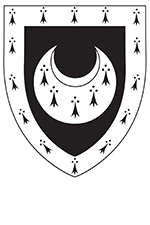Trinity Hall
All books of the College to be kept in some safe room, to be assigned for the College Library, so that all the scholars of the College may have common access to them... The books of the Doctors of Civil and Canon law are to remain continuously in the said Library Chamber fastened with iron chains for the common use of the Fellows. William Bateman. Translation, Willis and Clark, Architectural History of Cambridge (Cambridge, 1886) vol. 3, p. 391.

Trinity Hall was founded in 1350, as the fifth College of the University of Cambridge. Our founder was William Bateman, Bishop of Norwich and he bequeathed a number of volumes of civil law, canon law, chapel books and theology which formed the basis of the College’s first library.
Many of Trinity Hall’s most valuable manuscripts and early printed books came through the efforts of Robert Hare (d 1611), a Cambridge benefactor and antiquary, who acquired many works from the former monastic libraries. The notable manuscripts include Speculum Augustinianum of Thomas of Elmham (MS 1), Liber Contra XII Errores et Hereses Lollardum by Roger Dymmok (MS 17) and Boethius’ Consolation of Philosophy (MS 12) which are digitised in this collection.
Today, our special collections comprise about 6,000 printed books, and over 70 manuscripts. Further details can be found on the College Library website.

